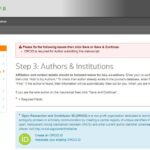This week, Christine Vanderlinden provides perspectives on everything from patient engagement to Good Publication Practice 2022 guidelines. We read about mounting concerns over the influence of AI following the falsification of “seemingly authentic” data in a recent study. We also read a report on the sharing of federally funded data in the USA, and about the APC burden faced by researchers in India. Finally, we signpost three webinars: one considering the future of collective open access funding models; one discussing the open science movement in Ukraine; and one exploring whether libraries are ready for the transition to open publication.
To read:
Christine Vanderlinden on patient engagement in pharmaceutical publishing via The Publication Plan | 7-minute read
As recognition for the value of involving patients in medical communications grows, publication policies and guidelines are increasingly advocating the inclusion of patient voices in medical publications. In this interview by The Publication Plan, Christine Vanderlinden (Senior Director, Head Global Publications at GSK) provides her insights on various topics, including patient authorship, data sharing and the development of the Good Publication Practice 2022 guidelines.
AI-fabricated data adds to research integrity concerns via Nature | 5-minute read
Large language models and other forms of artificial intelligence (AI) have great potential to contribute to the production and dissemination of scientific literature. But is their potential to corrupt greater than anticipated? The results from a recent study evaluating the ability of AI to generate false data sets suggest so. In this article in Nature, we hear from Jack Wilkinson (Research Fellow, University of Manchester) on his assessment of the fabricated data and how the very AI used to generate the false data could be the key to identifying such subversions of the scientific process.
Financing open access publishing of federally funded research via The White House | 2-hour read
The USA is actively working towards the consistent and open sharing of data arising from publicly funded projects. This report, produced by The White House Office of Science and Technology Policy, provides a detailed overview of current federal public access policies in the USA, along with the variety of open access models used globally. The report concludes that the open science landscape is evolving rapidly, and continued monitoring is needed to ensure that the insights gained from federally funded data are shared effectively.
Researchers in India pay more than 50% of global APCs via Current Science | 15-minute read
This research article published in Current Science presents findings from a recent study that analysed the number of gold open access articles published in Web of Science-indexed journals by Indian researchers in 2020. The study estimated that Indian researchers paid approximately US$17 million in article processing charges (APCs) in 2020, representing more than half of the US$30 million spent on APCs globally in the same year. In their concluding remarks, the authors highlight APCs as a barrier to open science in the Global South and call for a national Indian open access policy to support “equity and access to scholarly communications”.
To watch:
Funder perspectives on open access via Open Access Scholarly Publishing Association | 1-hour watch
What might open access funding look like after cOAlition S ends the funding for OA publishing under transformative agreements after 2024? This webinar – originally aired on 15 November 2023 – is the second in a two-part series from the Open Access Scholarly Publishing Association (OASPA) on the future of collective open access funding. Taken together, the webinars contribute valuable publisher and funder perspectives on the development of alternative open access models.
To engage with:
Open access and war – Ukraine as a case study via Aspen Institute
How are researchers and government agencies in Ukraine balancing their commitments to promoting open access in the context of war, and what could we learn from them? On 12 December 2023, moderator Nataliya Shulga (Senior Manager of Global Science, Aspen Institute Science & Society Program and Co-founder, Ukrainian Science Club) will discuss just that with panellists Oleksandr Berezko (Founder and President of the Institute for Open Science and Innovation), Paloma Marin-Arraiza (Engagement Manager [Global Consortia], ORCID), Yulia Bezvershenko (Co-founder and Coordinator, Science at Risk), David Spergel (President, Simons Foundation) and Serhii Zharinov (Research Assistant, Faculty of Economics and Management, Kyiv National Economic University). Registration for this free virtual webinar is now open.
Are libraries prepared for the open access world? via Open Access Scholarly Publishing Association
Join OASPA on 14 December 2023 for this webinar exploring the role of research libraries in an open access world. Chaired by Demmy Verbeke (Head of KU Leuven Libraries Artes, KU Leuven), the webinar will invite insights from panellists Joanna Ball (Managing Director, Directory of Open Access Journals), Anna Clements (Director of Library Services and University Librarian, University of Sheffield), Lai Ma (Lecturer/Assistant Professor, University College Dublin School of Information and Communication Studies) and Rachael Samberg (Scholarly Communications Officer, University of California Berkeley Library). Registration is required to attend this free webinar.
Enjoy reading our content? Then make sure to follow us on Twitter/X and LinkedIn for regular updates!






